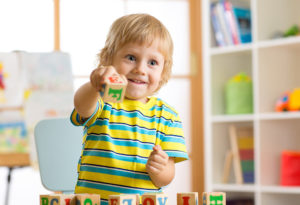I appreciate that phonemes and graphemes are probably still very much etched into your mind.
But I want to take you away from the boring bits of learning about phonics. I want to show you how they can genuinely be fun with some engaging activities to encourage speech and language development (not just teacher fun but actual fun).

Here are some of the reasons I think they can (and should be) fun:
- It’s just about making noise
- Practising them make you sound funny
- You realise your mouth is an instrument
- Your child will think you’re hilarious when you join in (and maybe a little odd)
- It’s an activity you can do anywhere without any resources, money or equipment
- They’re proven to improve literacy and language skills
How does phonics help their language skills?
There are many ways to learn phonics, and activities to encourage speech and language development. However, the root of this is learning to decode words. Decoding is essentially sounding out the letters, understanding the structure of the word in order to say it correctly. Whilst not all words follow the ‘common sound spelling rules’ over 84% of the English language does.
A good understanding of phonics will lead to a solid foundation of speaking.
Phonics helps your child learn to read with word recognition. This means they’ll be able to read words quickly and accurately, so their reading fluency improves. Over time your child’s understanding of word formulation and sound will progress which will translate into their speech.
As a result, their vocabulary will improve, their confidence will grow and their language skills will flourish.
 How can you make them fun?
How can you make them fun?
- Letter hunt. It wasn’t that long ago we were doing the same with chocolate eggs. The same concept applies but use letters instead. If you don’t have toy letters to use, you could cut letters out of a newspaper or magazine or (even easier) write each letter on the back of a piece of paper and stick it around the house. If you’re feeling really ambitious you could attach each letter to an object of that sound and perhaps incentivise your little ones with a ‘treat’ at the end.
- Picture this. Before you hand over your very expensive phone to your kids, buy a cheap disposable or if you have the funds you could purchase a child friendly digital camera. Whilst you’re out you could get them to take pictures of ‘things beginning with f’ and so on. You could then see how much they retained by printing the pictures out and get them to sort into groups of sound.
- Alphabet ball. Burn off some of that energy by throwing a ball to your child and say a letter or word and they have to reply with the sound or a word to match that letter. This is a great one that all the family can get involved with AND it will tire them out (mentally and physically).
- Read rhyming books. These are best read by an adult to start with as the rhythm and pace can be hard for a child to do without being shown first. You could try and read them fast and in silly voices which will help them match the sounds and remember the rhymes.
- Writing in sand/shaving foam/flour. This one is best done away from carpets and expensive furnishings. You could have a list of simple CVC (consonant, vowel, consonant) words and they can spell them out in the material. It’s sensory, it’s messy and it’s active. Great way to learn whilst making it feel like play!
A good understanding of phonics compliments a habit of reading and together they’re skills for life.



